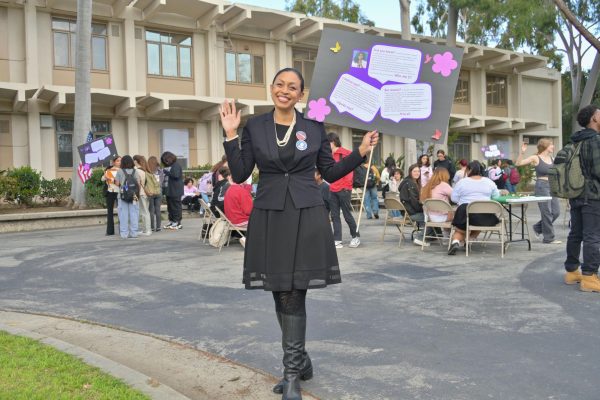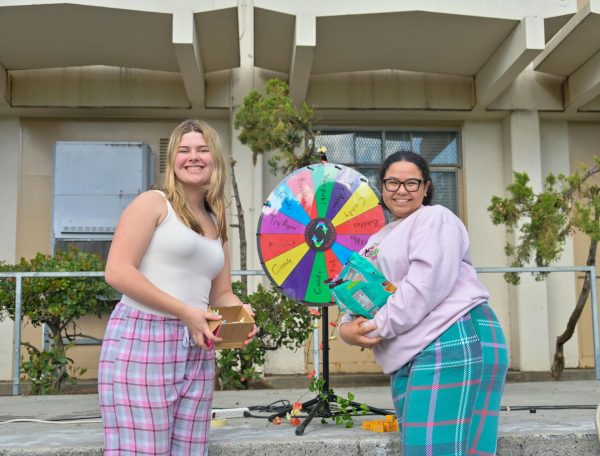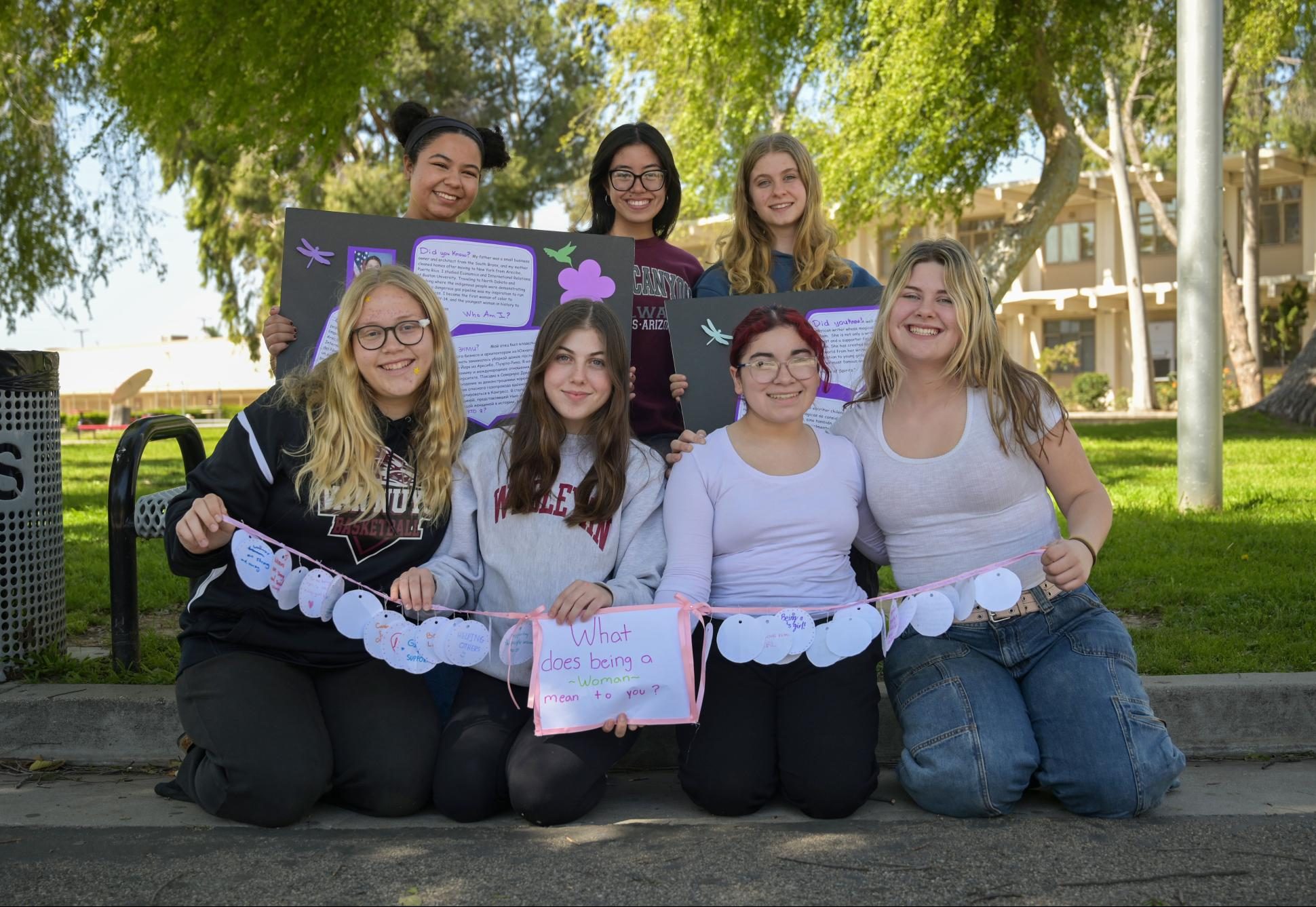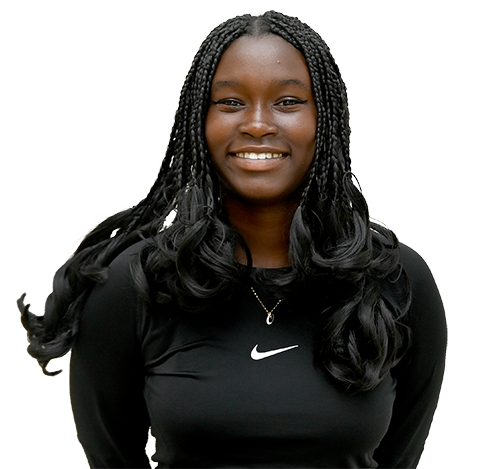“I love being a girls’ girl,” freshman Kenya Perryman scribbled.
“It’s fun to show my feminine side and I love making others happy,” junior Karen Grewal wrote.
“I love giving power and being confident in myself,” junior Teagan Greer jotted down.
These are three of the many phrases written down on Post-It notes, all intending to answer the overarching question of what it means to be a woman.
In honor of March being Women’s History Month, the school’s Women Make Change (WMC) club introduced new, interactive ways to celebrate women’s accomplishments. On March 7 during lunch, tables were set up across the quad with stations where students gathered to participate in a number of events commemorating women and their achievements.
Female administrators stood around the victory stand, holding posters filled with information about influential women like Alexandria Ocasio-Cortez and Michelle Obama.
A scavenger hunt was hosted, and prizes were given out as a means of motivating students to participate in every activity.

The purpose of this event was to inspire female students, teachers and admin to dig deep and discover what it means to them to be a woman.
The WMC club focuses on bringing attention to female activists like Malala Yousafzai, Rosa Parks and Angela Davis who have brought about the gender equality seen today, as well as lesser-known and equally essential women in the strive for equality. The club also works to educate students on the history of women’s empowerment.
During this event, the founders and presidents of the WMC club, Emily Chavez and Kayla Balikyan-Davis, explained what womanhood means to them.
“To me, being a woman is about being a person with empathy, kindness and compassion,” WMC club co-founder and co-president Emily Chavez said. “That’s what I consider womanly. I feel like my womanhood is so much about treating people with the kindness that they deserve.”
Co-founder and co-president Kayla Balikyan-Davis expands on this idea.
“Womanhood is about being who you are, standing up for what you believe in and supporting people around you,” she said. “Our club was made to empower women at Van Nuys High School and put effort into making a change in our community as well as educating people about situations still going on.”
The idea of finding a community with people who have shared struggles who can stand up for one another is what prompted Balikyan-Davis and Chavez to create this club. They wanted to create a safe space where women could interact and learn about the historical journeys of women throughout the centuries.
Their mission is to equip women with the resources they need to stand up and fight for themselves.
“A big part of what we’re doing is giving women the resources to be able to do things, because a lot of women don’t know where to start,” Chavez said. “When it comes to making a difference in our community and making us feel empowered, a lot of women don’t know how to advocate for themselves because they’ve never been taught. We’re trying to give them a foot to stand on, to let women know that they can do anything and provide them with opportunities to do so.”
Their goal is to ultimately reach beyond the school gates and empower women outside of the school community.
“We want to focus on volunteering outside of school to help build our community and help women all around us,” Balikyan-Davis said. “We have been working on providing volunteer opportunities for people in our club, as well as providing scholarship opportunities.”
The WMC board tries to make a change in the lives of their club members by educating them on things previously unknown to them about women’s history. They focus on the impacts of one revolutionary woman per meeting.
Every Thursday, the club members come together to learn about influential women of both the past and present. Board members organize informational slideshows for members, focusing on one impactful woman per week. It’s a space where both women and men are educated beyond the women’s history taught in their social studies and history curricula.
Although social circumstances have improved for women in the past century, Balikyan-Davis and Chavez still see many instances of discrimination towards women today. They recall times when they’ve been overlooked, and their voices silenced.
“I’ll say something, and two seconds later a guy will say the exact same thing,” Chavez said. “Nobody listened to me, but when this guy says the same thing, he gets the credit for it and he gets noticed.”
For Balikyan-Davis, discrimination follows her almost every day.
“There’s a lot of mansplaining where people just think they’re better,” she said. “Sometimes I’m trying to do something, and someone comes and takes over. And I always try to explain to them that I can do it, but they never listen. We’re undermined in a sense where people don’t listen to us.”
Through their club, Balikyan-Davis and Chavez are trying to fight against all discrimination the best they can. The more people that are informed, the better situations get for women.
“We see a lot of discrimination towards women and people at the school, so we just wanted to make a place where we could provide people with a support group and anything they need,” Balikyan-Davis said. “We just wanted to make a place where people can reach out, learn and grow as a community.”
Both women emphasize making their club a safe space for everyone, especially women.
“A part of what made me want to start a club focused on women is that there are not many spaces where women can just be women or can just learn and empower each other,” she said.
“We try to show women that they can do everything. We do many things that educate a lot of women about situations that have happened in the past and how they can make that same difference that all of these activists have made.”
In a world where women’s voices are constantly overlooked, the WMC club has made their meetings a place where female voices are heard. They continuously make an effort

to equip women to go back out into the world and face discrimination head-on.
“We make sure everyone has a place to voice their opinions and feelings, and we take these comments into account,” Chavez explained. “We’ve made a little family with each other and we always try to accommodate them and make newcomers feel comfortable.”
Balikyan-Davis and Chavez explain that though their club is actively making an effort to accommodate women, it’s unacceptable that women still feel uncomfortable and discriminated against in their daily lives. They say that this discomfort goes beyond just being talked over by their male peers.
“There’s a lot of sexual harassment at this school,” Chavez said. “Women get objectified on the daily, and it’s crazy to see. For example, they whistle at women’s performances on stage, and the only consequence is a teacher telling them off. But people don’t realize how serious this objectification is, and it’s never talked about.”
Despite these struggles, women still find a way to stick up for each other, even outside the WMC club walls.
Chavez explains that one of her favorite things about being a woman is the sense of community it provides.
“When you’re a woman, there’s always an inherent care for other women,” she said. “I always feel like no matter what experiences you’ve gone through or what has happened to you, I’ll always want to help other women if they need a support system. I love how as a woman I can be there for other women and other women can be there for me.”
Balikyan-Davis goes on to say that this sense of community in womanhood is not only provided by female friends and family, but also by random women on the street.
For instance, wherever a girl feels uncomfortable in a situation out in public, other women pretend to know the girl in order to make her feel safe because there’s power in numbers.
“When in an uncomfortable situation, I’ve had women come up to me and pretend to know me in order to help me out,” she said.
While learning from the history of women’s fights is important, Balikyan-Davis emphasizes that you don’t have to be protesting or marching to be an activist yourself. A willingness to stand up for other women when they need it most makes you just as much an activist as those who rally on the street.




